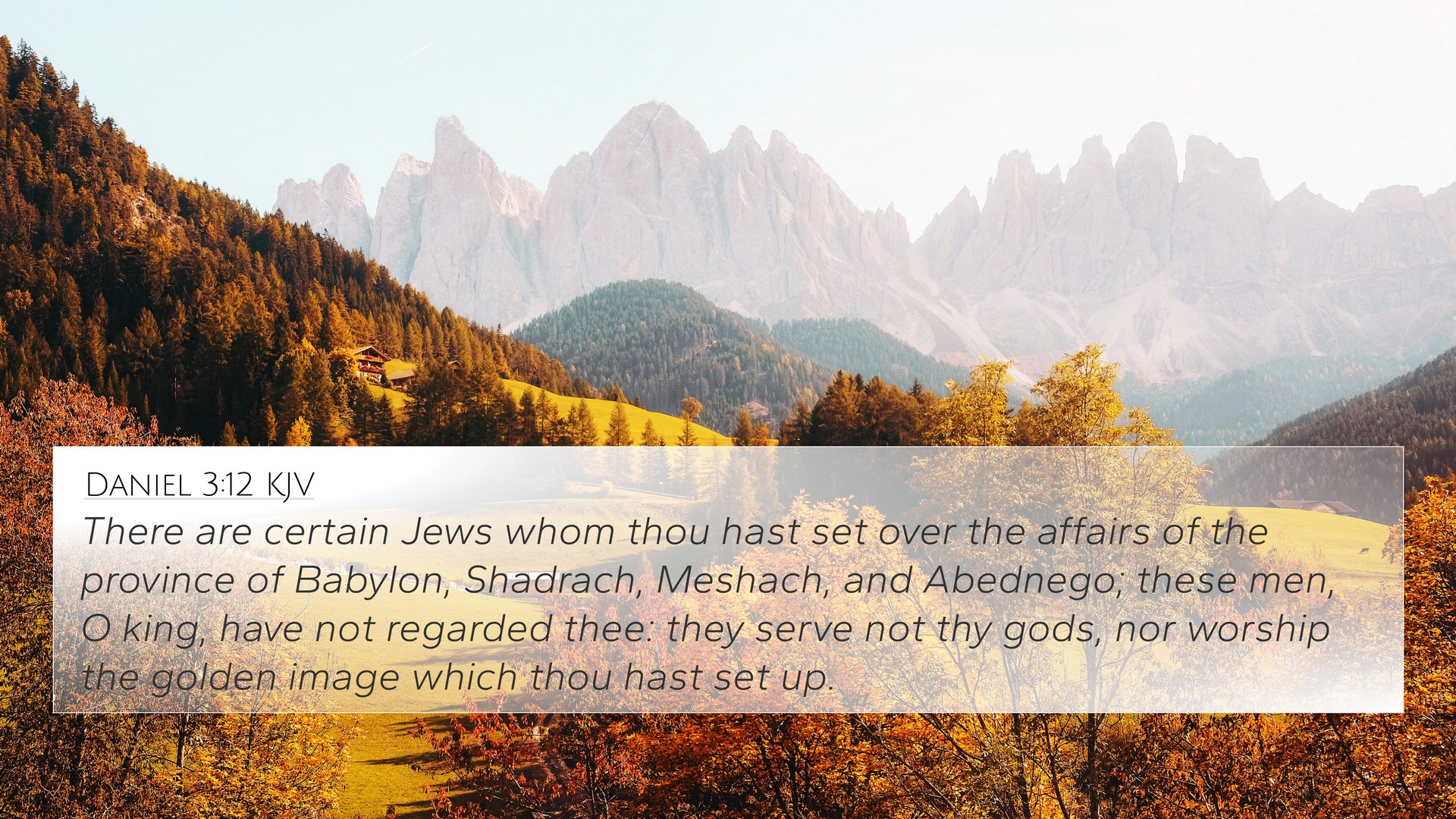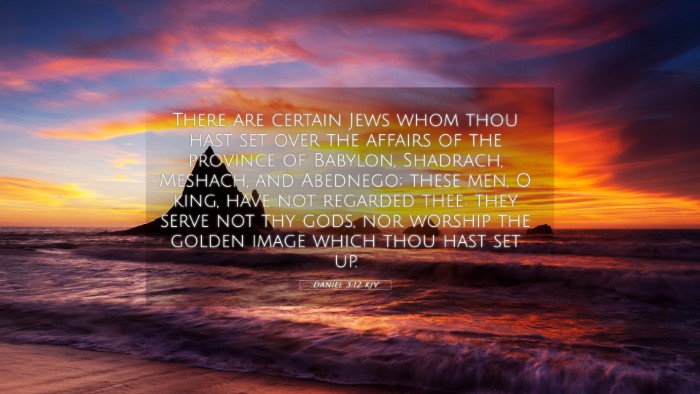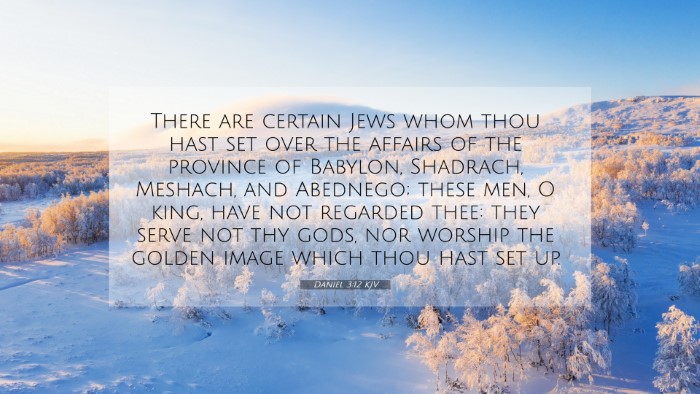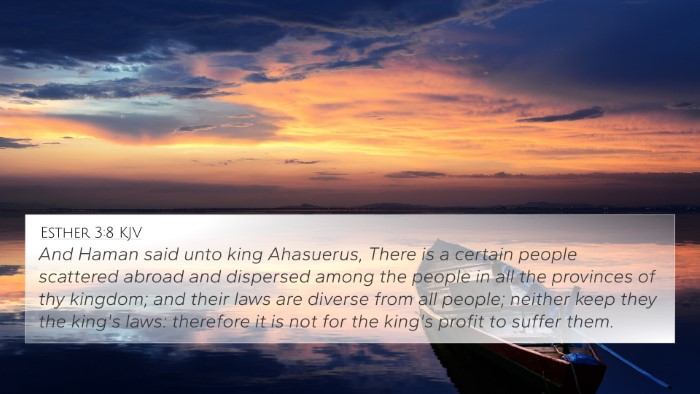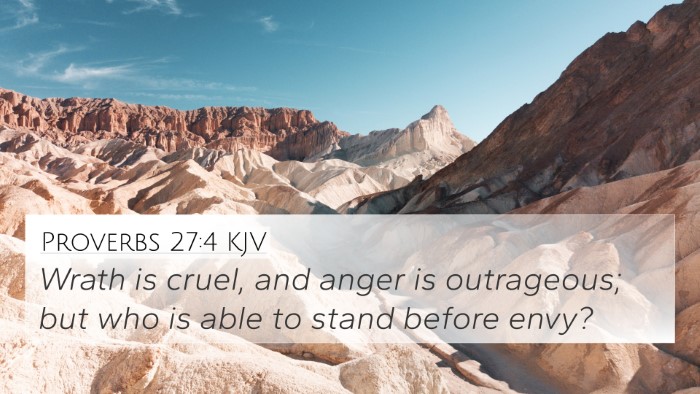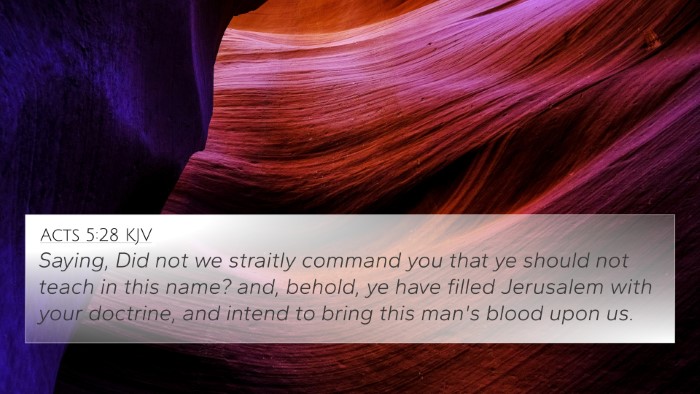Understanding Daniel 3:12
This passage, Daniel 3:12, addresses a significant moment of conflict between the king's decree and the faith of Shadrach, Meshach, and Abednego. These three young men, loyal to God, stand as witnesses of unwavering commitment even in the face of persecution. The verse reads:
"There are certain Jews whom thou hast set over the affairs of the province of Babylon, Shadrach, Meshach, and Abednego; these men, O king, have not regarded thee: they serve not thy gods, nor worship the golden image which thou hast set up."
Meaning and Interpretation
In this verse, we see several key themes emerge:
- Faithfulness to God: The refusal of Shadrach, Meshach, and Abednego to worship the king's golden image exemplifies absolute faithfulness to their God. This reflects a common biblical theme of loyalty, particularly when pressured by earthly authorities.
- Confrontation of Idolatry: The challenge against idol worship is a recurrent theme throughout the scriptures. The three men’s actions serve as a direct challenge against the idolatry that their culture promotes.
- Consequences of Allegiance: There is a clear implication of consequence for remaining steadfast in one's faith, a significant topic reflected in the lives of many biblical characters.
Cross-References
To fully grasp the implications of Daniel 3:12, several cross-references can enhance our understanding and showcase the interconnectedness of scripture. Below are key biblical references that relate directly to this verse:
- Exodus 20:3-5: The commandment against having other gods underscores the reason for their refusal to worship the golden image.
- 1 Kings 19:18: God’s assurance to Elijah, showing that he is not alone in his faithfulness, mirrors the situation of these three men.
- Matthew 10:32-33: Jesus emphasizes acknowledgment of Him before others, analogous to the stance taken by Shadrach, Meshach, and Abednego.
- Acts 5:29: Peter and the apostles' declaration of obedience to God over men presents a similar standpoint on authority.
- Romans 12:1: The call to offer our bodies as living sacrifices relates to the concept of prioritizing God over worldly demands.
- Hebrews 11:23-24: This passage illustrates the faith of Moses’ parents, paralleling the theme of standing firm in faith despite societal pressures.
- Revelation 2:10: The exhortation to remain faithful unto death affirms the principle shown in this narrative.
- Daniel 6:10: Daniel’s faithfulness in prayer despite decree reflects the broader theme of unwavering devotion to God.
- Isaiah 43:2: God's promise to be with His people during trials and tribulations echoes the experience of the three men in the fiery furnace.
- Philippians 1:29: The concept of suffering for Christ’s sake draws a connection to the potential consequences faced by the heroes of our passage.
Thematic Connections
Diving deeper into the themes within Daniel 3:12, we see connections not only to the immediate context but also to larger biblical narratives:
- Faith Under Fire: This theme resonates through various stories, such as the trials of Job and the incredibly difficult choices faced by biblical figures committed to their faith.
- God’s Deliverance: The eventual deliverance of Shadrach, Meshach, and Abednego parallels other instances of divine intervention, including the story of Jonah and the protection provided in times of peril.
- Community of Believers: Just as Elijah discovered he wasn’t alone, Daniel 3 reminds us of the importance of fellowship and standing firm together in faith during times of tribulation.
Practical Applications
The lessons derived from Daniel 3:12 encourage believers today to consider:
- How do we respond when our values are in conflict with cultural norms?
- What does it mean to remain faithful in a secular world?
- Can we find strength in the community to which we belong, as exemplified by Shadrach, Meshach, and Abednego?
Conclusion
Daniel 3:12 serves not only as a historical account but also as timeless exhortation, beckoning believers to consider their dedication and faithfulness amidst trial. The comprehensive cross-references provided reinforce the scriptural integrity and encourage an in-depth study that reveals the numerous connections within the biblical narrative. By examining how these scriptures interact through cross-referencing, we gain a fuller understanding of what it means to live out our faith boldly.
Ultimately, the experiences drawn upon in this verse reflect a crucial aspect of the Christian walk — standing firm in faith despite external pressures, looking to God's larger narrative for inspiration and guidance.
